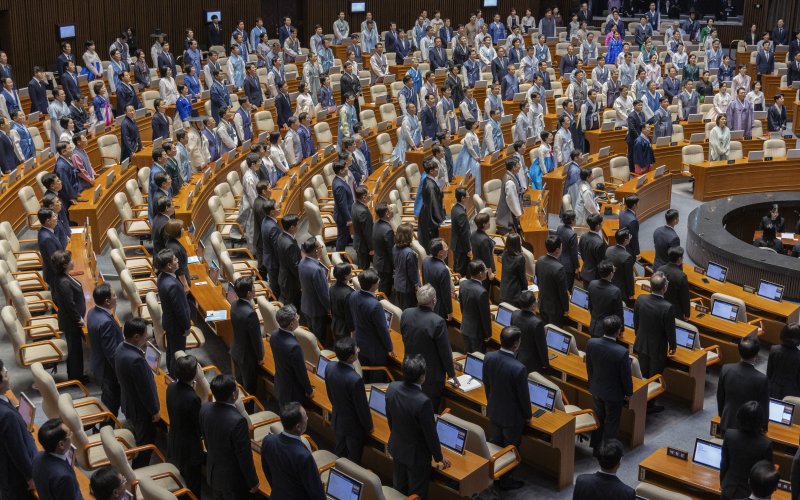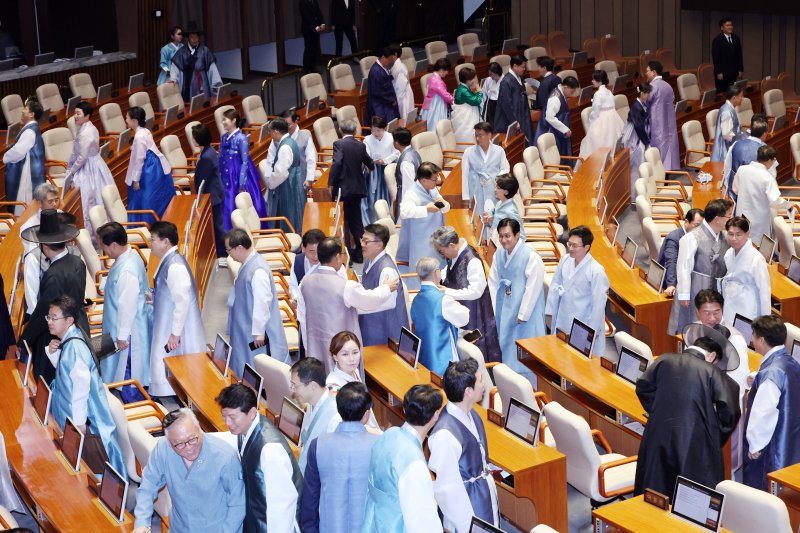'Hanbok vs Mourning Attire' Clash from the First Day of the Regular National Assembly... Ruling and Opposition Parties in Fierce Confrontation
- Input
- 2025-09-01 15:40:17
- Updated
- 2025-09-01 15:40:17
The 100-day schedule of the regular National Assembly begins
Woo Won-sik, Speaker of the National Assembly, urged cooperation between ruling and opposition parties
Fierce power struggle from the opening ceremony
Democratic Party in hanbok, People Power Party in mourning attire
Woo Won-sik, Speaker of the National Assembly, urged cooperation between ruling and opposition parties
Fierce power struggle from the opening ceremony
Democratic Party in hanbok, People Power Party in mourning attire


[Financial News] As the first regular National Assembly of the Lee Jae-myung government opened on the 1st, it is expected that the ruling and opposition parties will continue extreme confrontation over reform legislation. From the first day, the Democratic Party and the People Power Party clashed over dress codes and engaged in a power struggle. Previously, the National Assembly leadership accepted a proposal from Democratic Party member Baek Hye-ryeon to request ruling and opposition members to attend the regular National Assembly opening ceremony in hanbok, but People Power Party members entered the main assembly hall in mourning attire, wearing black suits and ties and ribbons inscribed with 'Parliamentary Democracy' in protest against the ruling party's legislative rampage. Members entering with solemn expressions in dark attire were also noticeable.
The National Assembly held the opening ceremony of the 429th regular National Assembly in the main assembly hall on this day and began the 100-day schedule. Speaker Woo Won-sik said in his opening speech, "The government organization law and next year's budget to be dealt with in this regular session are the first buttons that will determine the next five years of Korea," adding, "Both ruling and opposition parties must approach it with a sense of responsibility before the people." He further urged, "It is true that various conflicts and difficulties are expected. However, even amidst conflict and confrontation, politics is about doing what needs to be done."
In particular, Speaker Woo emphasized, "Looking back, our 22nd National Assembly was operated in a more intense confrontation between the ruling and opposition parties than ever before," adding, "There were political upheavals, but even amidst that, the ruling and opposition parties came together." He highlighted the importance of cooperation between the ruling and opposition parties, mentioning the current situation of conflict.
However, despite such urging, the regular National Assembly opening ceremony on this day was a place where the conflict between the ruling and opposition parties was starkly revealed. Speaker Woo and Democratic Party members dressed in hanbok, and some members wearing traditional hats attracted attention by attending the main session. Lee Jun-seok, leader of the Reform New Party, also attended the opening ceremony in hanbok.
On the other hand, People Power Party members appeared in the main assembly hall wearing black ties and condolence ribbons. Song Eon-seok, floor leader of the People Power Party, explained at the general assembly of members held before the main session, "Wearing black ties and condolence ribbons to the opening ceremony today is a determination to confront the dictatorial politics of the Lee Jae-myung regime, which is destroying parliamentary democracy." Park Sung-hoon, chief spokesperson of the People Power Party, stated, "We want to strongly show the people that democracy is dead from this moment," adding, "We will strongly condemn (the ruling bloc) and fight with the new leadership."
The Democratic Party is announcing the handling of 224 key bills centered on four core tasks: livelihood, growth, reform, and safety, in the regular National Assembly. The Democratic Party has decided to speed up the handling of the amendment to the government organization law, which includes the separation of prosecution investigation and indictment, and the amendment to the special prosecutor law to expand the investigation of the three major special prosecutors. Democratic Party leader Jeong Cheong-rae stated at the Supreme Council meeting on this day, "We will definitely complete the historical tasks of the three major reforms - prosecution reform, media reform, and judicial reform - in this regular National Assembly." In response, the People Power Party is predicting a filibuster (legitimate obstruction of proceedings through unlimited debate), and the confrontation between the ruling and opposition parties is expected to become more intense. In addition, the confrontation between the ruling and opposition parties is expected to grow over the new government budget, personnel hearings for cabinet appointments, and the arrest motion for People Power Party member Kwon Seong-dong, for whom a special prosecutor has requested an arrest warrant on charges of receiving illegal political funds.
cjk@fnnews.com Choi Jong-geun Lee Hae-ram Reporter